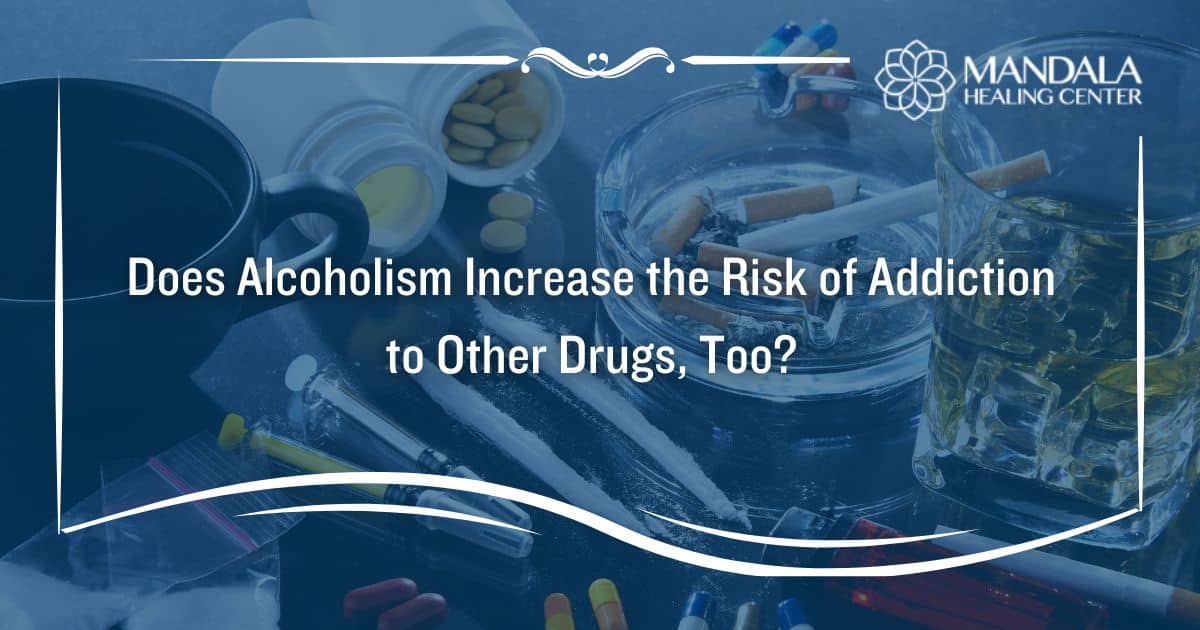Alcohol abuse is a serious issue in the United States. According to the National Center for Drug Abuse Statistics, 1 in 10 Americans age 12 or older suffers from an alcohol use disorder and 140,577 Americans die as a result of alcohol abuse in a given year.[1]
Alcoholism can significantly impact every area of your life, from your finances and social life to your physical and mental health. But does alcoholism increase your risk of developing an addiction to other drugs as well?
When you struggle with alcohol abuse, repeated alcohol abuse trains your brain to believe that pleasure and reward come from substances. This makes you more likely to turn to other drugs to deal with negative emotions.
What is Alcoholism?
Alcoholism is the common term for an alcohol use disorder, which is characterized by an inability to stop or control your drinking despite adverse social, occupational, or health consequences.[2]
When you suffer from alcoholism, drinking takes precedence over everything else in your life. People tend to have a hard time meeting their home, work, or school responsibilities when they suffer from an alcohol use disorder.
If you struggle with alcoholism, you will identify with several of the following symptoms:[2]
- Drinking more or longer than you intended
- Wanting to stop drinking or cut back on your alcohol intake but being unsuccessful
- Spending a lot of time drinking or recovering from the effects of drinking
- Wanting to drink alcohol so badly that you cannot think about anything else
- Finding that drinking is affecting your ability to perform at home, work, or school
- Continuing to drink despite facing issues with your family and friends
- Losing interest in previously enjoyed activities or hobbies because you would rather drink alcohol
- Getting into risky situations while you are drinking
- Continuing to drink despite facing mental health issues as a result of your alcohol consumption
- Having to drink more alcohol to experience the effects you desire (building a tolerance)
- Experiencing withdrawal symptoms when you are not drinking alcohol (physical dependency)
Does Alcoholism Increase Your Risk of Drug Addiction?
While alcoholism can increase your risk of experiencing financial issues, social isolation, worsened mental illness, and the development of physical health conditions, there is another consequence you should be aware of.
Being addicted to alcohol increases your chances of developing a drug addiction. A study published by the NIAAA found that nearly 64 percent of people seeking treatment for alcoholism met the criteria for a drug use disorder at some point in their lifetime.[3]
Even further, this study found that people who struggle with both alcohol and drug addiction are more likely to struggle with severe dependency. This means that you will probably experience the worst side effects of substance use disorders.
According to the U.S. Department of Justice, “More than 67% of individuals who started drinking before age 15 went on to use other illicit drugs, compared with less than 4% of those who never drank.”[4]
With that being said, it is clear that alcoholism increases your risk of becoming addicted to other drugs.
How to Tell if You Are Addicted to Drugs
If you struggle with alcoholism, you might have a hard time deciphering whether you also suffer from an addiction to other drugs because the symptoms of drug and alcohol addiction are similar. However, being aware of the signs of drug addiction can help you determine whether you need treatment for more than one substance use disorder.
The signs of drug addiction may include:
- Continuing to take a prescription drug after its no longer needed for a health issue
- Needing more and more of a drug to experience the same effects (building tolerance)
- Experiencing withdrawal symptoms when you do not use the drug (physical dependence)
- Having a hard time quitting the drug despite your desire to do so
- Experiencing uncontrollable urges or cravings to consume a drug
- Driving or doing other dangerous things while you are under the influence of a drug
- Sleeping too much or too little when compared to your previous sleeping habits
- Often displaying the signs of drug intoxication like bloodshot eyes, tremors, weight loss, sores on the skin, or needle marks
- Changing your friend group to hang out with other people who abuse drugs
- Stealing medications or money from friends and loved ones
- Experiencing worsened mental health symptoms
- Combining drugs with alcohol
Polysubstance abuse can be incredibly dangerous, as mixing different substances can lead to an increased risk of overdose. As a result, you should always seek professional drug and alcohol treatment.
Find Help for Alcoholism and Drug Addiction Today
If you or a loved one suffer from alcoholism, drug addiction, or a combination of the two, a drug and alcohol rehab center can help. With a combination of medical detox, evidence-based behavioral therapy, group counseling, and relapse prevention planning, addiction treatment can help you build a strong foundation of recovery.
To learn more about our drug and alcohol rehab program in South Florida, contact Mandala Healing Center today.
References:
- https://drugabusestatistics.org/alcohol-abuse-statistics/
- https://www.niaaa.nih.gov/publications/brochures-and-fact-sheets/understanding-alcohol-use-disorder
- https://pubs.niaaa.nih.gov/publications/aa76/aa76.htm
- https://www.ojp.gov/pdffiles1/bja/178940.pdf
- https://www.cdc.gov/stopoverdose/polysubstance-use/index.html












